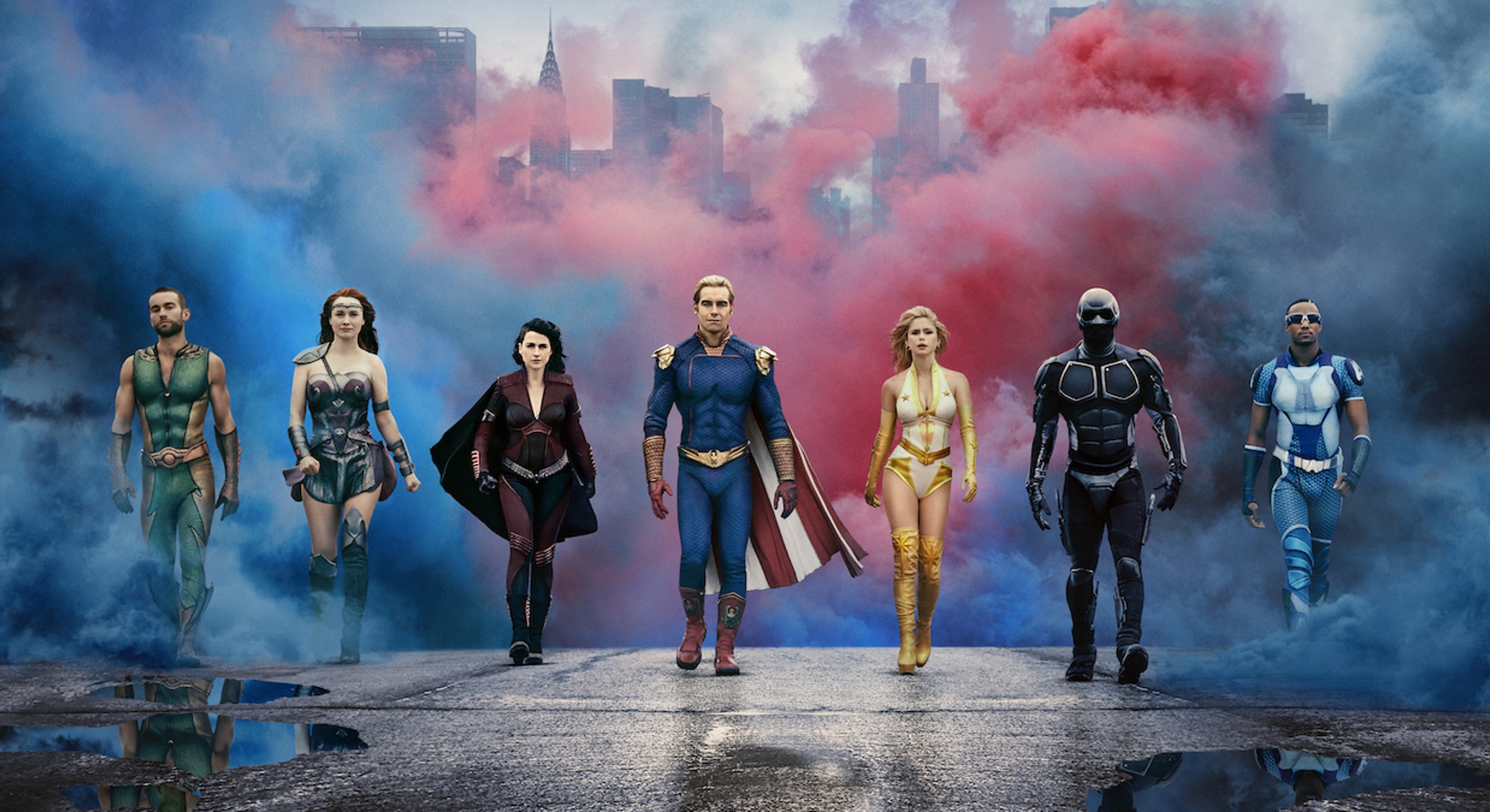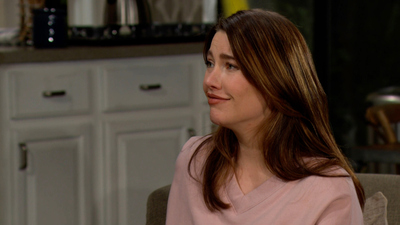What to Watch Verdict
'The Boys' is off to a strong sophomore start in Season 2, as mortals dare provoke "Gods" who see themselves less as protectors, and more as unchallengeable rulers.
Pros
- +
👊 Takes strong stances.
- +
👊 Punchy, outrageous action.
- +
👊 Diabolically entertaining.
Cons
- -
👊 A lot of subplots mixing.
Cue the Thin Lizzy because “The Boys” are back; Eric Kripke’s antithesis to Marvel’s cinematic universe, The Boys, that is. When last season concluded, Billy Butcher (Karl Urban) had his world shattered when Homelander (Antony Starr) dropped the bombshell that not only was Butcher’s wife alive, but she’s also a mother. Homelander’s super powered spawn, with Butcher’s wife. If you were worried that you'd miss the fallout from this revelation - don't be. Season 2 picks up right where we left off, and Butcher's mad as hell.
It’s the ultimate profession of victory, the nastiest "f-you" that Homelander can deliver, far worse than burning through Butcher’s cranium with laser beams. Homelander spends the first three episodes of this season flying between Vought headquarters and rural Nowheresville, much to the horror of Becca Butcher (Shantel VanSanten). Here’s Homelander, an idyllic representation of the American Dream™, handed a picket-fence sandbox that he uses to punish Butcher and Becca, influencing Ryan (Cameron Crovetti) to embrace his limitless powers as a “God.” Not to be punished by Becca who insists on raising Ryan as "normal" by suburbia standards (Homelander’s toxic masculinity and aggression towards outsiders shines like Paul Revere’s lantern in the night here).
It’s just one of the many ways The Boys comments on not only how power corrupts, but how those in possession of said power view themselves above everything. Laws, humanity, the universe; there’s a reason Homelander uses the word “God.” Much like how Vought International, with Stan Edgar (Giancarlo Esposito) playing a more prolific role this season, sees themselves as this world-dominating enterprise. Edgar’s desire to enlist “supes” in the military comes to fruition due to last season’s Compound V distribution to radicals, creating “supe-terrorists.”
Their operation hangs in the balance of ongoing efforts to expose their Compound V usage on babies to manufacture superheroes. Arguments lead to tension between Homelander and Edgar, allowing the latter corporate mastermind to land an exquisite verbal smackdown on the egotistical Superman knockoff. Edgar references Vought as a "pharmaceutical company," which crushes Homelander, who sees himself as Vought’s most prolific asset in a "superhero business."
Let’s stay with Vought International, “The Seven,” and Translucent's death (his funeral is chef’s-kiss level pageantry). Marketing maven Ashley (Colby Minifie) is back as Stillwell’s replacement, thanks to Homelander’s recommendation (which he confirms is only to own her and her position). Ashley attempts to fill Translucent’s vacancy, but Homelander mercilessly makes an example of her first tryout to convey his orders are the only orders. Then Edgar goes over Homelander's head to introduce the newest, and most rebellious, member of The Seven: Stormfront (Aya Cash).
In a matter of words, she’s the millennial-relatable, live-streaming, outspoken hero Vought needs in the public’s eye. She’s also Homelander and Ashley’s worst nightmare, as Stormfront makes a mockery of their first introductory junket by continually calling out sexists questions from journalists without censorship. On camera, she belittles Vought International’s costumes for their booty-tight designs and lack of pockets while seeing through forced optics of the event’s motto: “Girls Get It Done.” Stormfront is any PR handler’s worst nightmare, but she’s exactly who Vought wants controlling these narratives. Someone who even Starlight (Erin Moriarty) admires for her quotable social media blurbs and the rallying feminism rhetoric she’s turned into a marketable brand (I cannot wait to see where this arc goes).
The Boys isn’t playing games about its stance on what I’ll call “performative wokeness.” As I read it, Vought International stands in for a real-world governmental body. We’ve already witnessed how immeasurable abilities plague the minds of heroes like boozer Queen Maeve (Dominique McElligott), V-junkie A-Train (Jessie T. Usher), and the ruthlessly diabolical Homelander. Everything is a calculated decision based on data and analytics, from staged “supervillain” battles to rousing press conferences to empty apologies.
All these hidden evils that prove how easily the most maniacal thinkers can spin their own pleasant-as-pie narratives and fool just about anyone. “Fuck this world for confusing ‘nice’ with ‘good',’” spouts Stormfront (my favorite series line thus far, with context). In these first three episodes, faux-activism spotlights corruption and those who capitalize on what consumers desire to hear (Vought’s propaganda), as the masses gobble do-gooder lines without pause. Actions speak louder than words, and the heinous acts depicted so far in Season 2 show why those falsified, performative words are so dangerously manipulative.
Thus brings us to Hughie (Jack Quaid), Mother’s Milk (Laz Alonso), Frenchie (Tomer Capon), and Kimiko (Karen Fukuhara), who are becoming more of a “team” under Butcher’s leadership. Well, as much as they can be cooperative before Hughie’s conscience infuriates the supe-hunting Butcher or they get drench in blood one way or another. Much like the Guardians of the Galaxy, or the Suicide Squad, Butcher’s on-the-lam mercenaries find compassionate moments of growth amidst chemically enhanced destruction. Whether that be Frenchie’s continued brother-sister relationship with Kimiko (teaching her the alphabet to improve communication) or Butcher’s crass style of tough-love towards Hughie, which Mother’s Milk smooths over whenever Butcher inevitably ruins the moment with more violence.
You love to see Hughie discover his warrior's spirit as the wee lad steps to his thuggish leader more in these moments of take-no-shits assertiveness. To the point where Mother’s Milk and Frenchie toss glances, as to ask without words, “Is this where Hughie finally gets his ass kicked?” Butcher continues to push his team, whether driving boats through unforeseen obstacles or chancing certain death. Hughie’s responses reflect a “civilian” who’s sick of being nobody, but also finished with unchecked and dangerous authority. We’re starting to see these boys come together, which with more time, is going to form a unique bond given how almost every member is fighting for someone they love, deceased or living.
One aspect I’ll be looking for more development from is the forbidden romantic entanglement between Hughie and Starlight. It’s a pairing I rooted for when reading the comics, and one I’m actively invested in given Quaid and Moriarty's banter. Still, Hughie’s hangups thus far in Season 2 aren’t cutting deep enough into the tragedy at play between his human nobody and her worshipped luminary goddess. We see the two attempt burner phone communications and subway car meetups, but their “drama” plays to expectancies at this point. Homelander is the devil on Starlight’s shoulder, demanding she eradicates the sniffling loser with no test tube upgrades, Butcher the devil on Hughie’s shoulder who will always see Starlight as the enemy. So far, it’s an afterthought compared to the more impactful developments around Vought International’s crisis management.
Speaking of afterthoughts, Chace Crawford's role as aquatic disaster The Deep continues to be one of my favorite portrayals in this entire ensemble. We see a superhero hit rock bottom throughout the first three episodes, as he screams while standing on a water park’s child-friendly jungle gym fixture, “try swimming in the Mariana's Trench,” to emphasize loneliness. The thing is, he’s also given what I’ll call a “redemptive” arc as a supportive supe bails The Deep out of holding and introduces him to a suspicious congregation with promises of a new life.
There are potent hallucinogenics involved in a soul-searching journey, where The Deep connects with the abnormalities he’s morphed into a persona that humiliates women before they humiliate him first (his preventative safeguard). He’s charting every reclamation arc we roll our eyes at; another abusive type who finds “[x]” (Jesus, Flying Spaghetti Monster, fill in the blank). I’m not advocating the practice, but I support Crawford’s performance through The Deep's “forgiveness” process.
What separates gods from monsters is a thin margin. The Boys, throughout the first three episodes of Season 2, looks to exploit that blurry division in countless ways. Maybe it’s Homelander’s instigation of anger and rage to mold his mini-supe as the ultimate torment to Butcher, to Becca. Perhaps it’s Vought International and the board’s vile weaponization of “performative feminism;” nothing but a cheap ruse to gain polling points, or appease demographics that only seek surface-level affirmation. In this season, the showrunners (including Evan Goldberg and Seth Rogen) dare expose how those in charge never have the commoner’s interests in mind, only their profitable gain and bolstered influence. Humanity is nothing but another script to cast, with collateral damage just a part of the show. For an arc this furious, I’m eagerly anticipating how The Boys will make every bastard introduced so far pay oh-so-very dearly.
Oh, and don’t fret. You’ll still get all the exploding heads, battered brawls, and mammal entrails you can stomach.
The first three episodes of The Boys drop on Amazon Prime Video on September 4th. The rest of the series will be dropped weekly on Fridays.
Matt Donato is a Rotten Tomatoes approved film critic who stays up too late typing words for What To Watch, IGN, Paste, Bloody Disgusting, Fangoria and countless other publications. He is a member of Critics Choice and co-hosts a weekly livestream with Perri Nemiroff called the Merri Hour. You probably shouldn't feed him after midnight, just to be safe.












